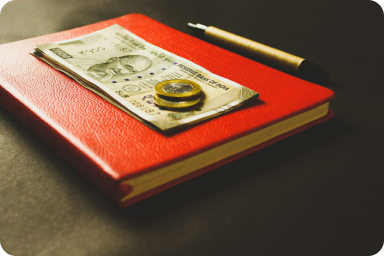Published
5 Reasons Your Personal Loan Was Rejected and How to Fix It
Table of contents
5 Reasons Your Personal Loan Was Rejected and How to Fix It
Getting a personal loan rejection can be a frustrating experience, especially when you are counting on the funds. If you are wondering, “Why was my personal loan rejected?”, understanding the common reasons behind it is crucial to avoid the same outcome in future applications.
Loan rejection not only delays your financial plans but can also dent your confidence. However, a rejection is an opportunity to learn and improve. By identifying the factors that led to the denial and taking corrective measures, you can strengthen your financial profile and secure approval in the future. Let us discuss the common reasons for rejection and how you can tackle them effectively. This blog explains personal loan rejection reasons and actionable steps to fix them, ensuring better chances of approval next time.
Why Do Personal Loan Applications Get Rejected?
Lenders assess various factors when deciding on personal loan application . Key reasons include poor credit history, high debt-to-income (DTI) ratio, unstable income, or incomplete documentation. These factors signal potential risk leading to personal loan rejection cases even for applicants with good intentions.
Common Reasons Personal Loans Get Rejected
Here are some common reasons for why personal loans get rejected:
- Low Credit Score: A low credit score is one of the most common personal loan rejection reasons, as it reflects financial mismanagement. The credit score refers to a number indicating the creditworthiness of a particular individual, and usually, it ranges from 300 to 900. Lenders often have a specific credit score requirement for approving personal loans. Your application is likely to be approved only if your credit score meets or exceeds this threshold. Also, lacking a credit history leads to rejection, too. To improve your chances, aim to maintain a credit score of 750 or higher by consistently paying your bills and loan installments on time.
- High debt-to-income ratio: When the amount of debt to which your income is already committed is significant, then lenders may see you as a risk.
- Unstable Employment or Income: Lenders prefer providing loans to individuals employed with reputable and established organizations. Consequently, if your company is not listed or registered, your application could be declined. Furthermore, most banks prioritize applicants with a stable employment history, making it essential to maintain a reliable and consistent work record. Having at least three years of work experience is often highly valued and can significantly improve your chances of loan approval.
- Incomplete Documentation: Missing essential documents like ID proof or income verification can lead to rejection.
- Multiple Recent Loan Applications: Too many loan inquiries in a short period can negatively impact your credit score and raise red flags for lenders.
Improving Your Debt-to-Income Ratio to Avoid Rejection
A high DTI ratio is a common reason why personal loans get rejected. To improve your ratio:
- Pay off existing debts, starting with high-interest ones.
- Increase your income by taking on additional work or freelancing.
- Avoid applying for new loans until your DTI is within an acceptable range (typically below 40%).
- Consolidate debts to reduce monthly payments and manage them more effectively.
Benefits of Fixing Loan Rejection Issues for Future Applications
Addressing the factors behind your rejection can yield long-term benefits, such as:
- Improved Credit Score: Paying off dues and managing credit responsibly boosts your score.
- Better Financial Management: Understanding why was my personal loan declined encourages healthier financial habits.
- Increased Approval Chances: Fixing rejection reasons positions you as a more credible borrower for future applications.
Challenges You Might Face When Applying for a Personal Loan
Applying for a personal loan is not always smooth sailing. The following are some challenges:
- Strict Eligibility Criteria: Lenders often have rigid rules regarding income, employment, and credit scores.
- High-Interest Rates for Risky Profiles: If approved despite issues, you may face higher interest rates.
- Limited Loan Amounts: Lenders may restrict the loan amount if they perceive you as high-risk.
Tips to Improve Your Chances of Personal Loan Approval
Some tips to improve your chances of personal loan approval are:
- Check Your Credit Report: You must regularly review your report for errors and take steps to improve your score.
- Reduce Outstanding Debts: Lower your financial obligations to improve your DTI ratio.
- Apply Strategically: Avoid submitting multiple loan applications within a short span.
- Choose the Right Lender: Platforms such as Stashfin offer flexible options for borrowers with varying profiles.
- Prepare Documentation: Ensure all required documents are complete and up-to-date.
If you are worried about personal loan rejection cases, Stashfin provides convenient loan options with minimal documentation and fast disbursals. Whether you are tackling rejection issues or seeking a reliable lender Stashfin is here to help you get back on track.
Final thoughts
A rejected personal loan application is not the end of the road. Understanding why was my personal loan rejected and fixing the issues, you can turn things around for future applications. Focus on improving your credit score, maintaining the DTI ratio, and increasing financial discipline in order to increase your chances for approval. You may choose reliable lenders such as Stashfin for a smooth and reliable borrowing process.
Frequently Asked Questions
1. Can I get a personal loan with bad credit?
Yes, but your options may be limited. Some lenders specialize in loans for bad credit, often with higher interest rates. Improving your credit score before applying is recommended.
2. How long after a loan rejection can I apply again?
It’s advisable to wait at least 3-6 months after a rejection. Use this time to address the reasons for rejection and improve your financial standing.
3. Do personal loan rejections impact my credit score?
Yes, loan rejections themselves don’t impact your score, but the hard inquiries made during the application process can slightly lower it.
4. Can I apply for a personal loan if I have too much debt?
You can, but approval is less likely if your DTI ratio is high. Focus on reducing your debt or increasing your income to improve your chances.
- All Posts
- All topics
- Bonds
- Cash Loan
- Child Education Insurance
- Corporate Bond
- Credit Cards
- Credit Report
- Credit Score
- Critical Illness Insurance
- Customer Success
- Cyber Insurance
- Design
- EMI Calculator
- EPF
- Expense Management
- Finance
- Home Appliance Insurance
- Home Insurance
- Industry News
- Instant Loan
- Insurance
- loan
- Loan Protection Insurance
- Medical Loans
- Mobile Loan
- Personal Loans
- Product
- Salary Protection
- Sentinel App
- Small Loan
- Software Engineering
- Stashfin App
- TeleMarketing
- Testimonials
- Trading Account
- Travel Insurance
- Wallet Protection
- Wedding Loans

A personal loan is often a saviour when you need financial assistance. Personal loans are flexible and accessible for various...

Taking out a personal loan is a common financial solution for meeting various expenses,...